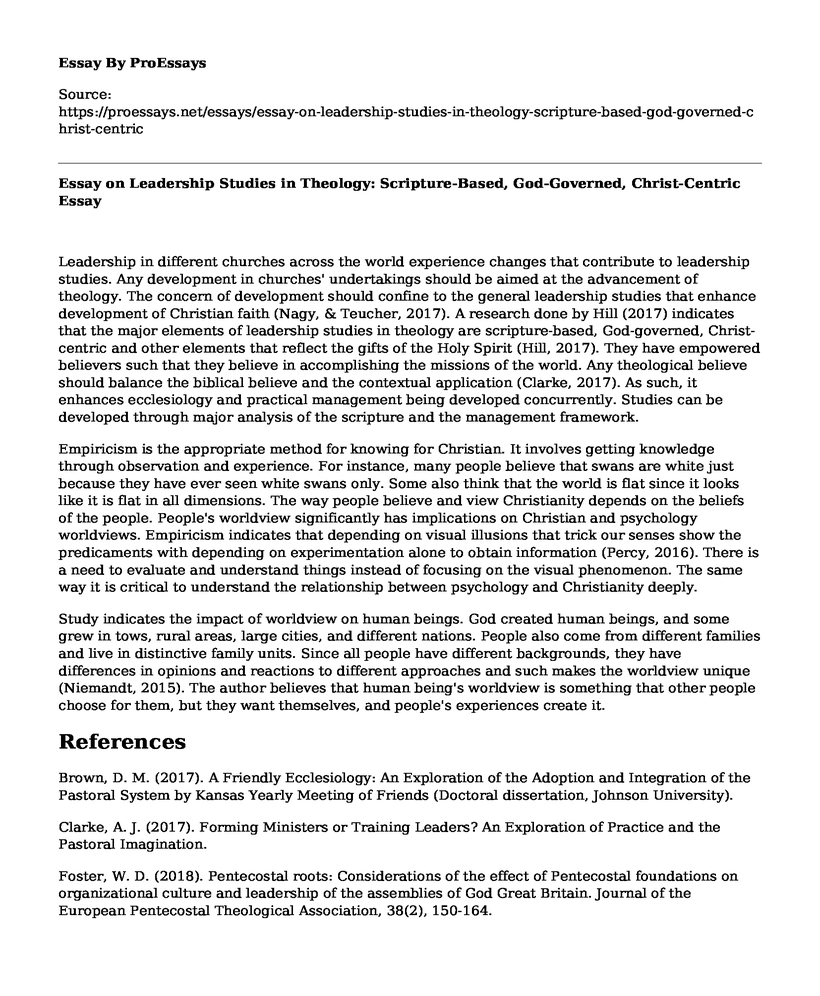Leadership in different churches across the world experience changes that contribute to leadership studies. Any development in churches' undertakings should be aimed at the advancement of theology. The concern of development should confine to the general leadership studies that enhance development of Christian faith (Nagy, & Teucher, 2017). A research done by Hill (2017) indicates that the major elements of leadership studies in theology are scripture-based, God-governed, Christ-centric and other elements that reflect the gifts of the Holy Spirit (Hill, 2017). They have empowered believers such that they believe in accomplishing the missions of the world. Any theological believe should balance the biblical believe and the contextual application (Clarke, 2017). As such, it enhances ecclesiology and practical management being developed concurrently. Studies can be developed through major analysis of the scripture and the management framework.
Empiricism is the appropriate method for knowing for Christian. It involves getting knowledge through observation and experience. For instance, many people believe that swans are white just because they have ever seen white swans only. Some also think that the world is flat since it looks like it is flat in all dimensions. The way people believe and view Christianity depends on the beliefs of the people. People's worldview significantly has implications on Christian and psychology worldviews. Empiricism indicates that depending on visual illusions that trick our senses show the predicaments with depending on experimentation alone to obtain information (Percy, 2016). There is a need to evaluate and understand things instead of focusing on the visual phenomenon. The same way it is critical to understand the relationship between psychology and Christianity deeply.
Study indicates the impact of worldview on human beings. God created human beings, and some grew in tows, rural areas, large cities, and different nations. People also come from different families and live in distinctive family units. Since all people have different backgrounds, they have differences in opinions and reactions to different approaches and such makes the worldview unique (Niemandt, 2015). The author believes that human being's worldview is something that other people choose for them, but they want themselves, and people's experiences create it.
References
Brown, D. M. (2017). A Friendly Ecclesiology: An Exploration of the Adoption and Integration of the Pastoral System by Kansas Yearly Meeting of Friends (Doctoral dissertation, Johnson University).
Clarke, A. J. (2017). Forming Ministers or Training Leaders? An Exploration of Practice and the Pastoral Imagination.
Foster, W. D. (2018). Pentecostal roots: Considerations of the effect of Pentecostal foundations on organizational culture and leadership of the assemblies of God Great Britain. Journal of the European Pentecostal Theological Association, 38(2), 150-164.
Francis, L. J. (2016). Ordinary Theology, Theological Method and Constructive Ecclesiology. In Exploring Ordinary Theology(pp. 29-38). Routledge.
Hill, G. (2017). Salt, Light, and a City: Ecclesiology for the Global Missional Community: Volume 1, Western Voices. Wipf and Stock Publishers.
Nagy, T. M., & Teucher, B. M. (2017). Ecclesiology and Conflict Resolution: A Congregational Case Study. Ecclesial Practices, 4(1), 87-111.
Niemandt, C. J. (2015). Complex leadership as a way forward for transformational missional leadership in a denominational structure. HTS Theological Studies, 71(3), 01-09.
Niemandt, C. J. P. (2016). Transformative spirituality and missional leadership. Mission studies, 33(1), 85-103.
Niemandt, C. J. P. (2016). Transformative spirituality and missional leadership. Mission studies, 33(1), 85-103.
Percy, M. (2016). Emergent archiepiscopal leadership within the Anglican Communion. Journal of Anglican Studies, 14(1), 46-70.
Pietrzak, A. (2016). The Via Ascendens Method and its Significance for Ecclesiological Studies. A Latin American Case Study. Roczniki Teologiczne, 63(09), 95-110.
Robertson, D. (2016). A Theology of Leadership: from social justice for transformation (Doctoral dissertation, Murdoch University).
Stanford, R. (2015). The Ecclesiological Grounding of Pauline Language of Leadership in 1 and 2 Timothy.
Taylor, N. L. (2019). Seeking the Mind of Christ Together: Progressive Baptist Ecclesiology as a Framework for Congregational Decision Making, an Educational Initiative of the Center for Baptist Heritage and Studies in Cooperation with River Road Church, Baptist, Richmond, Virginia (Doctoral dissertation, Mercer University).
van den Heuvel, S. C. (Ed.). (2018). Leading in a VUCA World: Integrating Leadership, Discernment and Spirituality. Springer.
Cite this page
Essay on Leadership Studies in Theology: Scripture-Based, God-Governed, Christ-Centric. (2023, Jan 23). Retrieved from https://proessays.net/essays/essay-on-leadership-studies-in-theology-scripture-based-god-governed-christ-centric
If you are the original author of this essay and no longer wish to have it published on the ProEssays website, please click below to request its removal:
- Approaches to Ethical Decision Making Essay
- Educational Preparations and Roles of Clinical Nursing Leaders (CNLs) Essay
- Essay Sample on Corporate Governance
- Journal Report: Specific Ideas Gained About Leadership Paper Example
- Essay Sample on the Ecclesial Leadership Models and Structures Present in the Early Church
- Essay Sample on Vroom-Yetton-Jago Model of Decision Making
- Value-Based Leadership: a Necessity for Success - Essay Sample







